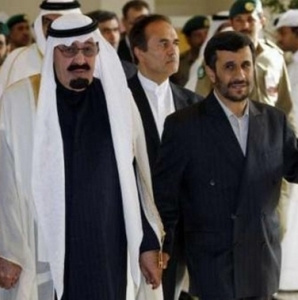The Condition for Negotiations: Saudi Arabia has to Repent

The relations between these two countries faced many changes, especially after the revolution. After the Islamic revolution in Iran and the establishment of an ideological Shia government, Saudi Arabia and its satellites felt threatened and began an antagonistic rivalry with Iran since the early 80’s. Iran, on the other hand, tried to reinforce its supporters and spread its ideology in regions like Lebanon, Syria, Egypt, and Yemen.
It should be said that after the fall of Saddam, Iran’s influence in Iraq’s political and social life increased and with the extremist fundamentalists at work in Iran, the pressure on Iran by Saudi Arabia and the West increased and Iran-phobia entered a new era in the international scene. Iran’s policy during the presidency of Ahmadinejad has been based on increasing military and nuclear power despite all the sanctions on it. The existing atmosphere resulted in the building of military strongholds in countries like the Emirates and Saudi Arabia, which increased arms rivalry in the region.
After the reaction of the Islamic Republic to anti-Iranian Western and Arab policies the US and European support for the Arab Persian Gulf countries increased. This process reached its pinnacle when uprisings in Bahrain were supported by Iran and Saudi Arabia started to accuse Iran of supporting anti-Bahraini government protesters.
The events in Bahrain and the accusation made against Iran for its involvement in Bahrain’s domestic issues temporarily halted Riyadh-Tehran relations.
Foreign Minister Ali Akbar Salehi started visiting Arab countries to return relations to a normal state, and also to collect support for the exit of Saudi forces from Bahrain. However, he could not visit Saudi Arabia, since doing so had turned into a taboo in the Iranian political scene.
Currently, it seems that the situation is calmer and Riyadh-Tehran relations could restart. Some politicians who believe that relations between the two countries are inevitable prefer to use a softer tone. The speaker of the Parliamentary National Security Commission told ISNA, “Saudi Arabia has committed horrible acts in the region, especially in Yemen and Bahrain, and is suffering from a bad reputation; therefore it is obvious that it is Saudi Arabia that should take the first step and remove its forces from Bahrain, and apologize to the Bahraini people.”
However, the reason behind these words was the fact that India is trying to get closer to Saudi Arabia as an alternative to Iran which it is having problems with in its oil transactions. But Kazem Jalali has taken advantage of the opportunity, and advised Saudi Arabia to work to change its tainted reputation.
He has also said that, “Saudi Arabia has to change its attitude first and then it is possible for Iran to enter a new phase of negotiations.”
This same position is also one taken by a conservative MP, Hamid Reza Tarraghi, who has said that as long as Saudi forces are cracking down on the Bahraini people we cannot negotiate with them. But the administration believes that this issue could also be among the negotiating topics with Saudi Arabia.
Tarraghi has said that no negotiations can begin as long as the issues of Lebanon, Iraq, Syria and Bahrain are not resolved. In other words, if Iran and Saudi Arabia do not find a common platform to start off with, then crises and challenges will continue to exist in the region.

